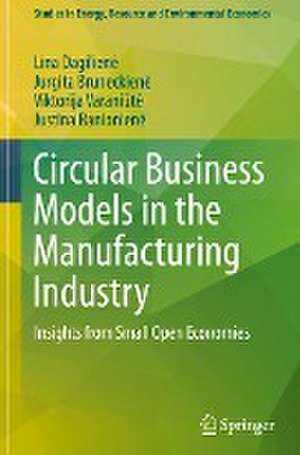Circular Business Models in the Manufacturing Industry: Insights from Small Open Economies: Studies in Energy, Resource and Environmental Economics
Autor Lina Dagilienė, Jurgita Bruneckienė, Viktorija Varaniūtė, Justina Banionienėen Limba Engleză Hardback – 2 mai 2023
| Toate formatele și edițiile | Preț | Express |
|---|---|---|
| Paperback (1) | 550.57 lei 38-44 zile | |
| Springer International Publishing – 3 mai 2024 | 550.57 lei 38-44 zile | |
| Hardback (1) | 641.38 lei 6-8 săpt. | |
| Springer International Publishing – 2 mai 2023 | 641.38 lei 6-8 săpt. |
Preț: 641.38 lei
Preț vechi: 754.56 lei
-15% Nou
Puncte Express: 962
Preț estimativ în valută:
122.74€ • 127.67$ • 101.33£
122.74€ • 127.67$ • 101.33£
Carte tipărită la comandă
Livrare economică 12-26 aprilie
Preluare comenzi: 021 569.72.76
Specificații
ISBN-13: 9783031288081
ISBN-10: 3031288084
Pagini: 174
Ilustrații: XIII, 174 p. 54 illus., 51 illus. in color.
Dimensiuni: 155 x 235 mm
Greutate: 0.45 kg
Ediția:2023
Editura: Springer International Publishing
Colecția Springer
Seria Studies in Energy, Resource and Environmental Economics
Locul publicării:Cham, Switzerland
ISBN-10: 3031288084
Pagini: 174
Ilustrații: XIII, 174 p. 54 illus., 51 illus. in color.
Dimensiuni: 155 x 235 mm
Greutate: 0.45 kg
Ediția:2023
Editura: Springer International Publishing
Colecția Springer
Seria Studies in Energy, Resource and Environmental Economics
Locul publicării:Cham, Switzerland
Cuprins
Chapter 1. Introduction .- Chapter 2. Transition to Circular Business Models.- Chapter 3. Circular Performance of Small Open Economies .- Chapter 4. Circular Patterns of Manufacturing Companies.- Chapter 5. Circular Transformation of the Textile Industry.- Chapter 6. Circular Transformation of the Furniture Industry.- Chapter 7. Circular Transformation of the Plastic Industry.- Chapter 8. Concluding Remarks and Insights.
Notă biografică
Dr. Lina Dagilienė is a Professor and Principal Investigator of the Digitalization Research Group at the School of Economics and Business, Kaunas University of Technology, Lithuania. She has participated in and led various research projects (Horizon 2020, Lithuanian Research Council, Erasmus+). Her research interests include corporate sustainability, circular transformation, circular business models, sustainability reporting, ethical issues of digital audit.
Dr. Viktorija Varaniūtė is an Associate Professor and Researcher of the Digitalization Research Group at the School of Economics and Business, Kaunas University of Technology, Lithuania. She has participated in several research projects (Lithuanian Research Council, Erasmus+) and conducts research in areas such as circular business models, sustainability management and reporting, performance management in relation to value and digital transformation.
Justina Banionienė is a PhD student in the Digitalization Research Group at the School of Economics and Business, Kaunas University of Technology, Lithuania. Her research interests include circular economy modelling through general equilibrium models, investments in the circular economy, and circular business models. She has participated in research projects funded by the Lithuanian Research Council.
Textul de pe ultima copertă
The book takes a multi-level perspective, focusing on circular business models by manufacturing industries in European small open economies. The book conceptualises circular business models and combines theoretical foundations with best practices when such models appeared in the textile, furniture, and plastics industries. It also explores barriers, drivers, challenges, and opportunities for leading manufacturing companies to implement circular activities across the value chain. This book offers a qualitative and transformative approach, spread across three different manufacturing industries, towards a circular transition. The findings will be of interest to practitioners and managers, policymakers, and general readers who are interested in the circular economy and environmental sustainability.
Caracteristici
Explores the implementation of circular economy model in Europe Presents various case studies on the textile, furniture, and plastics industries Examines best practices for circular business models



